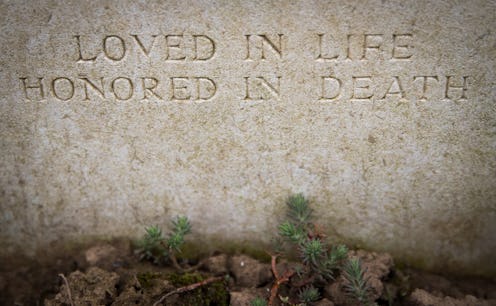News
Why It's OK To Be Sad About Terence Crutcher
Police shootings of unarmed black men happen far too often. Every week or so, there's another death, another story, another brief moment of news coverage, and they all seem to blend together. Most recently, it's Terence Crutcher, a 40-year-old black father and husband whose car broke down in the middle of the road. Only a few minutes later, he was shot dead, with no weapon, no movement or threat toward the police officers, and no laws broken. Bustle reached out to the department, but the Tulsa police chief declined to comment. Crutcher's death is an injustice of irredeemable proportions, but anger has not accomplished anything thus far, and it's OK to allow yourself to feel sad about this loss of life. Remembering Crutcher's life is the best way to honor him, because he was so much more than just the way that he died.
Crutcher was a family man, a brother, father, husband, and son who enjoyed spending time with his loved ones. He was a staple of the community at the New Heights Christian Center, where he sang in the choir with two of his daughters. He was a talented musician, and had recently enrolled in music classes at the local community college so he could make his family proud. But none of that mattered on Friday, because he was black, and therefore perceived as a threat. He was killed in the most unceremonious, disrespectful way possible, so at odds with the life that he lived. The injustice of his death elicits an almost automatic response of anger, but that's not what will best serve his memory.
When you talk about Crutcher, don't forget to be sad. It's a hard feeling to achieve genuinely — when you don't know the victim, it seems a little unrealistic to feel sad. But sadness is integral to a full appreciation of the life that was lost, and the way it was taken. It's unspeakably sad that this good man died in the middle of a highway, in pain, without any of the family he loved so dearly by his side to comfort him. It's sad that he won't get to see his children continue to grow, or finish his college degree, or ever sing in his church choir again. The loss of his life is just as important as the injustice of his death, and appreciating both helps you appreciate the other more. The righteous indignation that allies typically express in these situation is warranted and appreciated, but let yourself be truly sad as well. The world lost a good man, and there aren't nearly enough of those as it is.
The loss of Crutcher should hurt everyone deeply. By all accounts, he was a truly good person, and even if he did make some kind of mistake in the final moments of his life, it certainly wasn't anything that justified his death. That well-lived life is what was lost, so remembering his life will help to make that loss real. When the totality of his death is considered instead of just the circumstances by which it came to pass, then people can find true compassion and the will to see that no good man dies the same way next week.
